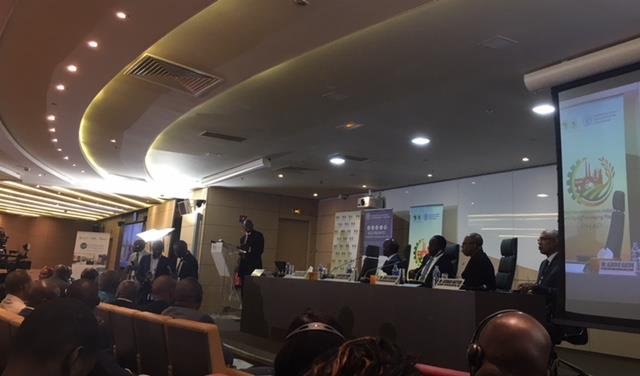AfDB: Post-Harvest Losses Reduction and Agro-Processing (PHAP) Flagship launch

On 21-22 November 2017 a high level ministerial dialogue was held to launch the Post-Harvest Losses Reduction and Agro-processing (PHAP) flagship funding by the African Development Bank (AfDB).
The programme included: Session 1 - Realizing the value of increased productivity through Agro-processing; Session 2 - Critical Roles of the Private Sector in Agro Product Development and Processing; Session 3 - Initiatives on Post-Harvest Losses and agro processing; Session 4 - Financing Model to scale up investments in Post-Harvest loss Reduction and Agro-processing; a Ministerial Dialogue Session on 'Key decision making to support PHAP in Africa'; Innovations and Best Practices in PHAP discussion and working group sessions.
The dialogue convened by FAO and AfDB gathered together members of African governments, public and private sector partners, academia and other stakeholder actors to building a strong partnership and collaboration aimed at ensuring the achievement of the four main components of the PHAP Flagship: 1. Policy formulation and institutional strengthening; 2. Agro-processing and storage facilities; 3. Technologies for PHL reduction and value addition; and, 4. Agricultural Value Chain and Governance. More information are accessible in the presentation of Damian Ihedioha, coordinator of the flagship. The presentation on "Advancing African Agribusiness: AFDB Private Sector Financing" prepared by the Principal Agribusiness Officer of the Agriculture and Agro-Industry Department in AfDB was of high interest.
Dr. Jane Ambuko of the University of Nairobi presented Recommendations & Emerging Issues from the 1st All Africa Postharvest Congress and Exhibition, held in Nairobi in March. Her presentation gave an overview of the main issues related to post-harvest in Africa and recommendations to ensure sustainable scaling up.
Mireille Totobesola presented the UN RBA joint project 'Mainstreaming food loss reduction initiatives for smallholders in food deficit areas' as a comprehensive approach to ensure sustainable upscaling of investments in post-harvest management solutions and strategies. She also presented the Community of Practice on food loss reduction considering the importance awareness raising, knowledge sharing on existing feasible solutions and models (presentation).
Brett Rierson, head of the WFP Post-Harvest Knowledge & Operations Centre, has presented WFP work on 'Empowering farmers - Reducing Post-Harvest Loss' projecting a short video accessible here.
Dr Yvette Diei Ouadi, Fishery officer in the FAO Fisheries & Aquaculture Department gave a presentation on interventions linked to two major fish processing methods in Africa. The commonalities and specificities in the drivers of success within these snapshot cases of loss reduction in small and medium scale fisheries were raised as well the feasibility information that can make a strong business case. Without any doubt, the market-led approach has been instrumental in the adoption of best practices and in curving losses in a sustainable manner. The perspectives of a wider upscaling programme were discussed with concrete suggestions to donors funding.
Cephas Taruvinga, Technical Adviser to the African Union on Food Losses and Waste made a presentation on how FAO is supporting the African Union Member States to reduce postharvest losses and achieve Malabo Goals. In the framework of "Support to African Union in the development of policies and strategies for country-specific plans to reduce post-harvest food losses" project support is being provided at two levels: at the African Union Commission level and at country level. The AUC level support is focused on developing the capacity of African Union to coordinate and align countries and partners in implementing the Malabo Loss reduction road map; and, at country level the support is in the development and implementation of policies and strategies to achieve the Malabo loss reduction country targets. The country level strategies being developed offer opportunities for the African Development bank to invest in post-harvest loss reduction.
Key issues and recommendations highlighted in the discussions include the following:
- Promotion of agro-processing adopting value chain approaches for adding value that creates jobs, better livelihoods and make Africa nations economically independent
- Creation of an enabling environment which is required by the private sector to invest in agro-processing and post-harvest losses reduction technologies
- Policy directions within country and regions and committed leaders to drive this process is needed
- Governmental extension services and staff/technicians to be on ground reaching out to smallholder operators on new innovations and technologies
- Infrastructure development is key to reducing post-harvest and promoting agro-processing, there is need to support the development of regional markets
- The Bank is willing to go the scale with technologies that have worked by linking the technology providers to regional member countries, to see the possibility of doing business and disseminating available, existing, and efficient technologies
- The AfDB PHAP to encourage youth involvement in agricultural transformation through innovative financial mechanisms as needed to support these youths to go to scale
The Proceedings will soon be shared.
